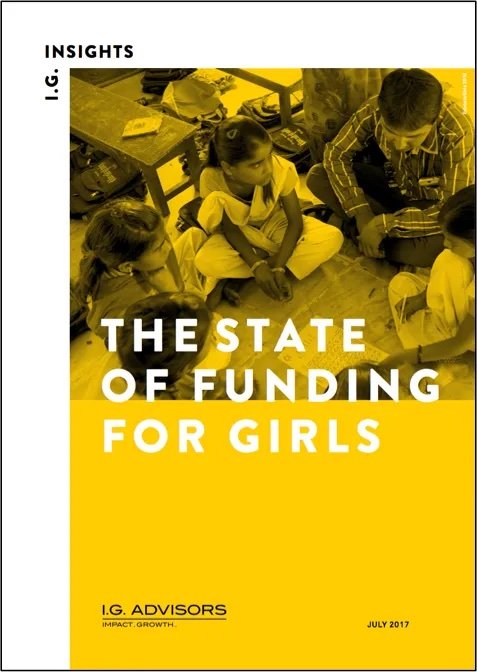I.G. Insights: The State of Funding for Girls

I’ve been in the girls funding space longer than many but not as long as some — it was nearly a decade ago when I was given the opportunity to help design and scale a corporate programme focused on adolescent girls in urban slums.
In ten years, I’ve had the great privilege to meet incredible girls with inspiring stories of overcoming hardships and challenges I couldn’t possibly imagine to achieve amazing things. I’ve also been lucky to call some of the smartest men and women in the world, who have dedicated their lives to helping girls unlock their potential, my colleagues, clients and friends.
It is in this spirit of awe and inspiration that I.G. is proud to announce the release today of our first edition of I.G. Insights: The State of Funding for Girls. Over the past 10 months, we have research and reviewed organisations and individuals investing in girls and the NGOs that focus on them. We found four examples of what we think are inspiring practice and partnerships: Standard Chartered Bank, the Kiawah Trust, the With and For Girls Collective and Educate Girls. We also offer our recommendations for funders on how to ensure the momentum around girls does not wane, and to create effective, collaborative funding mechanisms that allow girls to reach their full potential.
We hope you’ll be as inspired as we are by the stories of these different types of funders who have all tackled the issue of funding girls in unique ways. Their experiences have not been without challenges, but they’ve come up with innovative solutions that others can learn from. Their stories are too good not to share.
Download the report here and contact us if you have any questions or feedback.
As we close the chapter on 2024 and step into a new year, our Advisor, Harriette, finds herself reflecting on what’s needed to move philanthropy forward in 2025.
It’s not a groundbreaking revelation that staff wellbeing and burnout are huge challenges our sector is facing right now, and the sector-wide lack of investment in professional development has a lot to answer for.
Our Associate Advisor Charly makes the case that greater investment in your grantmaking team = greater impact for your organisation, and beyond.
While philanthropy and football may seem worlds apart, I’ve started thinking about the many similarities that can provide valuable lessons for those in the philanthropic sector. I for one, am always learning about the essential elements of football that can inspire and inform effective philanthropy.
Through the power of collective design, our fundraiser and grantmaker #FixTheFlow Fellows have imagined the future of our philanthropic funding system, and we should all listen carefully.
In the coming months, our Associate Carli is exploring the complexities of social innovation and will share her learnings, insights, and questions with you.
I.G.’s CEO Emily shares some of the mistakes and challenges she found during her leadership journey, and what she learned and will share in I.G.’s new Leadership Lab.
I’m expected to show up as a leader, but don’t feel like a leader. Introducing Impact & Grow: A Leadership Lab.
Leveraging Limited Funds For Humanitarians: Insights from the 2024 #HX24 conference, organised by Save the Children UK and the Humanitarian Leadership Academy.
Social enterprises have a particularly interesting relationship with Monitoring, Evaluation and Learning (MEL) as they need to capture both the financial and social/ environmental impact of their work, and speak to a wide range of potential funders and investors. Caitlin McLoughlin chatted to Abhinav Khanal, Co-Founder and Executive Director of Bean Voyage, to explore this further.
Image Credit: Bean Voyage
A round up of everything the I.G. team did in 2023!
Introducing a new, dedicated funders stream to I.G.’s #FixTheFlow Fellowship! We’re accepting applications until 17th November (for a 2024 start). Join our movement at fixtheflow.org
Join us for one (or all!) our eight workshops in our Autumn Training Series, where we will cover some of the trickiest topics facing fundraisers today.
What does meaningful and effective learning actually mean in practice?
Our Advisor Caitlin interviews Kore Global’s Emily Boost on learning how to learn and all things feminist evaluation and learning.
How do we balance our passion and our desire to give our best, whilst not being consumed by failure to live up to our own or others’ expectations?
At I.G. Advisors (I.G.), we’re often approached to design and implement evaluations for our clients to understand the impact of their grantmaking, fundraising or programmatic strategies, and identify opportunities for evolution.
The ‘lone saviour’ approach won’t cut it (and it also might destroy you).
It’s hard to believe it now that we’re living through a polycrisis, but the financial crisis and Great Recession of the 00s felt like a once-in-a-lifetime jolt to the world order at the time.
What you can learn from others leading philanthropic networks like yours
‘Well, we could have called that one.’
I.G. Advisors (I.G.) recently had the pleasure of collaborating with The Big Give and Rosa on the Women and Girls Match Fund.
Being a parent is often a thankless task. You take something and nurture it, treating it with love and care, losing sleep and worrying if — against all odds — , it will achieve its full potential and become the best it can be. It may never, ever show gratitude for your sacrifice. And then one day it will grow up and leave.
New I.G. Insights report explores how fundraisers and funders can support digital fundraising for racial justice issues.
#TaxPhilanthropy — wealth holders have the power to pay more tax right now even if governments fail to reform their policies
How starting small might be the most effective way to change the world.
An insight into “Modern Grantmaking: A Guide for Funders Who Believe Better is Possible”
A couple of weeks ago, I.G. brought back its much-loved book club event for our first in-person get together in over a year.
Podcast listeners — a new episode of What Donors Want is out! We had the honour of speaking with David Simas, CEO of the Obama Foundation.






























